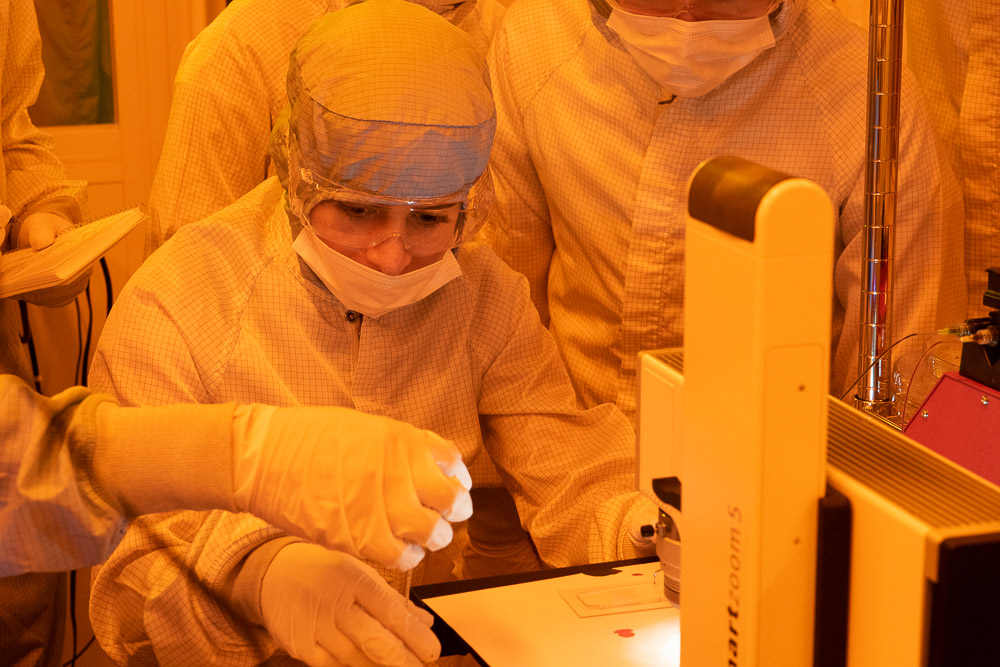Curriculum

Students will first develop a core knowledge that spans several academic disciplines such as semiconductor, quantum engineering, nano IoT and energy. The Master’s Degree in Nanotechnology prepares students for this profession with a solid foundation in technical core areas (7 courses), including a project-based laboratory course that trains students on state-of-the-art cleanroom and characterization facilities. To complete the degree, students choose 3 courses from a total of 10 courses on science- or technology-related electives that best match their academic interests and professional goals. Students also attend and present summaries of technical seminars as part of their training. Research is optional, and would count as 2 of the 3 elective courses, should students be interested in writing a research thesis.
Course Requirements
To receive the degree of Master of Science in Engineering in Nanotechnology, students must complete TEN (10) course units at the graduate level (5000+), following the requirements below:
Category A: Required Courses (3 CUs)
-
ENGR 5040 – Fundamental Concepts in Nanotechnology
-
ESE/MSE 5250 – Nanoscale Science and Engineering
-
ESE 5360 – Nanofabrication and Nanocharacterization (Link);
or MSE 5650 – Fabrication and Characterization of Nanostructured Devices for Laboratory Experiences
Category B: Nanotechnology Core (4 CUs)
Select 4 from the following
Electrical and Systems Engineering (ESE)
ESE 5100 Electromagnetic and Optics
ESE 5130 Principles of Quantum Technology
ESE 5210 The Physics of Solid State Energy Devices
ESE 5230 Quantum Engineering
ESE 5260 Photovoltaic Systems Engineering
ESE 5290 Introduction to MEMS and NEMS
ESE 6210 Nanoelectronics
ESE 6250 Nanorobotics
ESE 6730 Integrated Photonic Systems
Materials Science and Engineering (MSE)
MSE 5050 Mechanical Properties of Micro/Nanoscale Materials
MSE 5200 Structure of Materials
MSE 5370 Nanomechanics and Nanotribology at Interfaces
MSE 5500 Elasticity and Micromechanics of Materials
MSE 5550 Electrochemical Engineering of Materials
MSE 5610 Atomic Modeling in Materials Science
MSE 5700 Physics of Materials
MSE 5750 Statistical Mechanics
MSE 6110 Advanced Synchrotron and Electron Characterization of Materials
MSE 6400 Optical Materials
Mechanical Engineering and Applied Mechanics (MEAM)
MEAM 5040 Tribology
MEAM 5050 Mechanical Properties of Micro/Nanoscale Materials
MEAM 5370 Nanotribology
MEAM 5500 Design of Microeletromech Systems
MEAM 5550 Nanoscale Systems Biology
MEAM 5700 Transport Processes I
MEAM 5750 Micro and Nano Fluidics
MEAM 5800 Electrochemistry for Energy, Nanofabrication & Sensing
Chemical and Biomolecular Engineering (CBE)
CBE 5250 Molecular Modeling and Simulations
CBE 5310 Nano-Transport
CBE 5350 Interfacial Phenomena
CBE 5450 Electrochemical Energy Conversion and Storage
CBE 5460 Fundamental Industrial Catalytic Processes
CBE 5550 Nanoscale Systems Biology
Bioengineering (BE)
BE 5550 Nanoscale Systems Biology
Category C: Science or Technology-Relevant Electives (3 CUs)
Select 3 pre-approved Science or Technology-Relevant electives
These courses may be chosen from any SEAS course (including engineering entrepreneurship, technology policy, thesis (NANO 5970), special topics, and/or independent study (NANO 5990), as well as technology-relevant courses from other Penn departments (typically physics, chemistry, math, biology, etc.). All electives MUST be at the 5000 level or above. The courses must have significant technical and scientific content and relevance to the student’s program. Approval must be obtained from the NANO program prior to enrollment in the course.
* The courses featured on the list above may vary from year to year.
